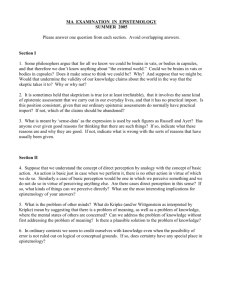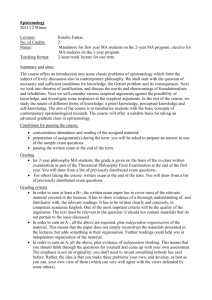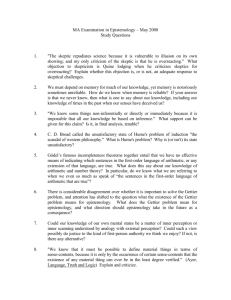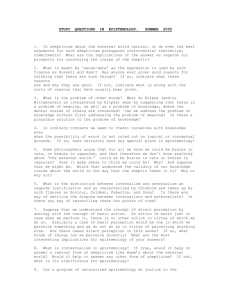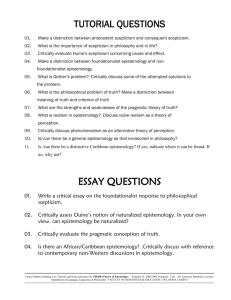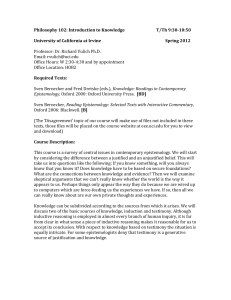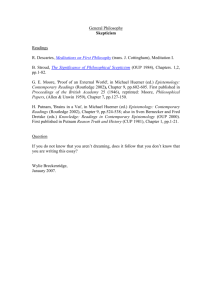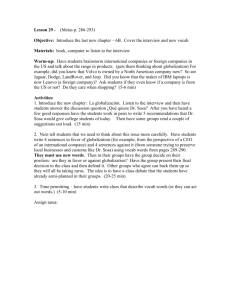PLEASE NOTE this is a sample reading list for the... may change from year to year.
advertisement
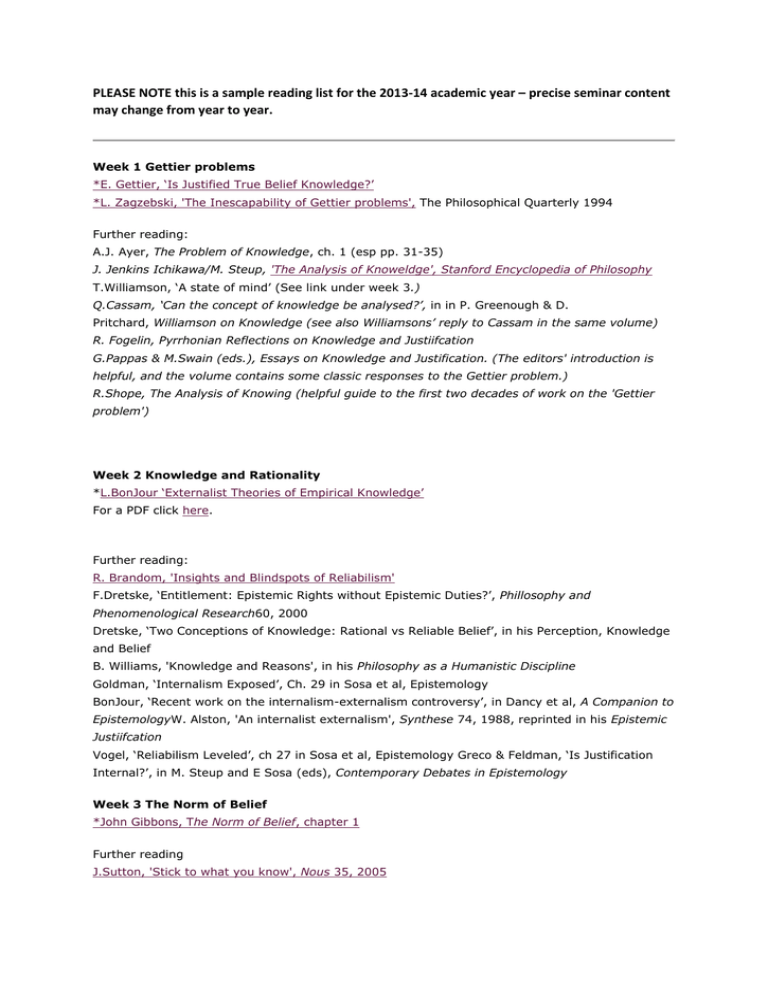
PLEASE NOTE this is a sample reading list for the 2013-14 academic year – precise seminar content may change from year to year. Week 1 Gettier problems *E. Gettier, ‘Is Justified True Belief Knowledge?’ *L. Zagzebski, 'The Inescapability of Gettier problems', The Philosophical Quarterly 1994 Further reading: A.J. Ayer, The Problem of Knowledge, ch. 1 (esp pp. 31-35) J. Jenkins Ichikawa/M. Steup, 'The Analysis of Knoweldge', Stanford Encyclopedia of Philosophy T.Williamson, ‘A state of mind’ (See link under week 3.) Q.Cassam, ‘Can the concept of knowledge be analysed?’, in in P. Greenough & D. Pritchard, Williamson on Knowledge (see also Williamsons’ reply to Cassam in the same volume) R. Fogelin, Pyrrhonian Reflections on Knowledge and Justiifcation G.Pappas & M.Swain (eds.), Essays on Knowledge and Justification. (The editors' introduction is helpful, and the volume contains some classic responses to the Gettier problem.) R.Shope, The Analysis of Knowing (helpful guide to the first two decades of work on the 'Gettier problem') Week 2 Knowledge and Rationality *L.BonJour ‘Externalist Theories of Empirical Knowledge’ For a PDF click here. Further reading: R. Brandom, 'Insights and Blindspots of Reliabilism' F.Dretske, ‘Entitlement: Epistemic Rights without Epistemic Duties?’, Phillosophy and Phenomenological Research60, 2000 Dretske, ‘Two Conceptions of Knowledge: Rational vs Reliable Belief’, in his Perception, Knowledge and Belief B. Williams, 'Knowledge and Reasons', in his Philosophy as a Humanistic Discipline Goldman, ‘Internalism Exposed’, Ch. 29 in Sosa et al, Epistemology BonJour, ‘Recent work on the internalism-externalism controversy’, in Dancy et al, A Companion to EpistemologyW. Alston, 'An internalist externalism', Synthese 74, 1988, reprinted in his Epistemic Justiifcation Vogel, ‘Reliabilism Leveled’, ch 27 in Sosa et al, Epistemology Greco & Feldman, ‘Is Justification Internal?’, in M. Steup and E Sosa (eds), Contemporary Debates in Epistemology Week 3 The Norm of Belief *John Gibbons, The Norm of Belief, chapter 1 Further reading J.Sutton, 'Stick to what you know', Nous 35, 2005 *T.Williamson, ‘A state of mind’ (This is chapter 1 of Knowledge and its Limits) C. Littlejohn & J. Turri (eds.), Epistemic Norms Week 4 Perceptual Justification *Hannah Ginsborg, 'Reasons for Belief' (Philosophy and PHenomenological Research 72, 2006) Furhter Reading J.McDowell, Perception as a Capacity for Knowledge — Mind and World, chs. 1-2 — 'Responses to Stroud and Brandom', in N.Smith (ed.), Reading McDowell M. McGinn, 'Non-inferential knowledge' H. Ginsborg, 'Perception, Generality and Reasons' J. Roessler, 'Perceptual Experience and Perceptual Knowledge', Mind 118, 2009 Week 5 Scepticism and Commonsense *Barry Stroud, 'Philosophical Scepticism and Everyday Life' (ch. 2 of The Significance of Philosophical Scepticism) Further Reading K. DeRose, The Case for Contextualism (esp. ch. 2, 'The Ordinary Language Basis for Contextualism') Week 7 Testimony and the Ideal of Autonomy *Elizabeth Fricker, 'Testimony and Epistemic Autonomy' (in J. Lackey & E. Sosa, The Epiistemology of Testimony ch. 10) Further reading B. McMyler, Testimomy, Trust and Authority, ch. 1 C. Coady, Testimony: A Philosophical Study T. Burge, 'Content Preservation' Week 8 Testimony and Second-Hand Knowledge *Benjamin McMyler, 'Knowing at Second Hand' (ch. 2 of Testimomy, Trust and Authority) Further Reading R. Moran, 'Getting Told and Being Believed' (in J. Lackey & E. Sosa, The Epiistemology of Testimony) A. Millar, 'The Social Transmission of Knowledge', in A. Millar, D. Pritchard, A. Haddock, The Nature and Value of Knowledge, ch. 8 Week 9 Scepticism and the Closure Principle *R. Nozick, ‘Knowledge and Scepticism’ [extract from Philosophical Explanations] Supplementary reading: J. Dancy, Introduction to Contemporary Epistemology, ch. 3 (this is a useful introduction to Nozick's account) S. Kripke, 'Nozick on Knowledge' in his Philosophical Troubles vol. 1 J. Vogel, ‘Are there counterexamples to the closure principle?’, reprinted in Sosa et al., Epistemology (ch. 23) (See also the editors’ Introduction to part IV, pp. 233-5 Dretske & Hawthorne, 'Is knowledge closed under known entailment?' in Steup & Sosa (eds.), Contemporary Debates in Epistemology A. Bruckner, 'Why Nozick is a Sceptic', Mind 1984 F. Dretske, 'Epistemic Operators', reprinted in Sosa et al., Epistemology B. Stroud, The philosophical Signifiance of Scepticism chs. 1 and 2 (ch. 1 is reprinted in Sosa et al., Epistemology) Week 10 Scepticism and Disjunctivism *J.McDowell, 'The Disjunctive Conception of Experience as Material for a Transcendental Argument' (in A.Haddock & F. Macpherson, Disjunctivism) Further Reading J. McDowell, 'Criteria, Defeasibility, and Knowledge' A. Millar, 'Disjunctivism and Scepticism', in J. Greco (ed.), The Oxford Handbook of Skepticism
